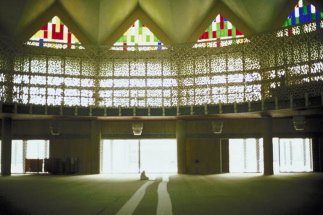
Dublin, 18 October 2004 (Compass) — In most countries of the world, citizens have the right to change their religion. But a recent case proves that this right does not necessarily apply in Malaysia.
On October 14, the Court of Appeal heard the case of Azlina Jailani, who adopted the name Lina Joy when she became a Christian in 1998. Lina Joy had appealed for a second time for the right to remove the word “Islam” from her national identity card.
A public announcement on the ruling is expected shortly.
In Malaysia, all ethnic Malays are deemed to be Muslim from birth. Malays and other indigenous groups make up 58 percent of the population. Chinese, Indian and other immigrant groups make up the remainder. A 2000 census claimed 60.4 percent of the total population was Muslim.
Lina Joy first applied for permission to change her religious status in 2001. Without this official change, she could not marry outside the Muslim faith.
However, according to a Malaysian newspaper report in May 2001, High Court Judge Datuk Faiza Tamby Chik declared that, “As a Malay, the plaintiff exists under the tenets of Islam until her death.”
Judge Faiza also ruled that the Islamic sharia court must handle the case, since conversion came under sharia jurisdiction.
This ruling created huge obstacles for Lina Joy. The Quran states that the act of apostasy — or abandoning the Muslim faith — is punishable by death. A sharia court is therefore highly unlikely to grant permission for a change of religion.
Under Malaysian law, apostates can be sentenced to three years in a faith rehabilitation center, where Muslim counselors try to persuade them to return to Islam. If apostates do not “repent,” they can be sentenced to a further six years of “rehabilitation.”
Lina Joy appealed against Judge Faiza’s 2001 ruling on the grounds that the Malaysian constitution guarantees freedom of religion. By doing this, she hoped to circumvent the sharia court.
Article 11 of the constitution guarantees Malaysian citizens the right to adopt the religion of their choice.
However, in practice it seems Article 11 does not apply to ethnic Malays. A report by the United States Commission on International Religious Freedom released on September 15 confirmed that while the constitution guarantees religious freedom, the government has placed “some restrictions” on that right.
Lina Joy argued that, as a Christian convert, she should not be subject to sharia law.
However, Islamic law professor Shad Faruqi stated in the Straits Times on October 11 that the requirement for official approval of conversions was a legal safeguard. Without it, Muslims could evade sharia law by leaving their faith whenever they were charged with a religious offense.
Lina Joy’s case highlights the need for Malaysia to set clearer ground rules on religious conversions. Both civil and sharia courts are reluctant to handle these cases because of the controversy involved.
A similar ruling earlier this year sparked heated debate in newspapers and online forums. The four Malay Muslims at the center of the debate first applied to change their religion in 1992, but the court refused permission and sentenced them to 20 months of imprisonment.
In August 1998, the four formally renounced Islam before a commissioner of oaths. The Kelantan Sharia Court then charged them with contempt for refusing to attend rehabilitation classes which were part of their original sentence in 1992, and sentenced them to an additional three years at a rehabilitation camp. Appeals to the High Court were rejected in July 2004.
Malaysian citizens are also debating Lina Joy’s case. The administrator of the United Subang Jaya Web forum, who goes by the name “Kwchang,” recently asked forum members, “If I do not have ‘Islam’ on my card, could I be negatively discriminated as well for being a non-Muslim?”
A member identified only as Timo replied, “This leads to another question, one that I have asked before. Do Malays have to be Islamic?”
Another member responded, “This is one of those things that make me ashamed of my own religion … there is nothing un-islamic [sic] in the act of denouncing Islam. In fact, it’s more un-islamic to forbid people to denounce it.”
Meanwhile, Prime Minister Abdullah Ahmad Badawi, addressing a congress of the ruling United Malays National Organization (UMNO) in September, promoted his concept of Islam Hadhari — a progressive form of Islam designed to equip Malay Muslims for the challenges of modern society.
Under Islam Hadhari, “Islam must be delivered in a judicious manner through reminders and advice, through dialogue and the exchange of thoughts … war and the use of force should not be used as a shortcut to success.”
Abdullah also claimed that UMNO, the ruling party, “staunchly opposes the use of Islam as an instrument to manipulate people’s beliefs.”
© 2004 Compass Direct. – Posted on Religioscope with permission from Compass Direct. – Compass Direct (Santa Ana, California) is a Christian news service dedicated to providing news on situations and events facing Christians persecuted for their faith. Compass Direct maintains an extensive network of news bureaus and correspondents around the world.